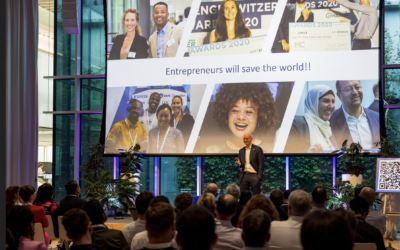Alwin Kopse shares how the Federal Office for Agriculture is driving food system transformation

Alwin Kopse is Head of the International Affairs and Food Systems Unit at the Federal Office for Agriculture – and also happens to be a big believer in the power of multi-stakeholder collaboration. We sat down with Alwin to talk about why Switzerland is already seen as a thought leader and a bridge builder when it comes to food system transformation.
Hello, could you tell us a bit about who you are and what you do?
Hello, I’m Alwin, Head of the International Affairs and Food Systems Unit at the Federal Office for Agriculture and co-lead of the global Sustainable Food Systems Program for the One Planet Network, a global movement for sustainable consumption and production. I’m also the national convenor for the UN Food Systems Summit’s food systems dialogues.
In these roles, I focus on bringing together public and private actors at a national and international level to identify and develop policy and practical solutions to ensure long-term food security and drive food system sustainability.
How does the Federal Office for Agriculture (FOAG) play a role in shaping more sustainable food systems?
The Swiss Sustainable Development Strategy 2030 (SDS 2030) defines the direction for Switzerland’s sustainable development. One of the strategy’s three priorities is sustainable consumption and production and food systems transformation clearly plays a key role in its delivery. The Federal Government has defined four strategic action areas to drive forward progress here:
- Fostering healthy and sustainable diets
- Reducing food waste
- Lowering GHG emissions across the food value chain, and
- Promoting environmentally and animal-friendly agriculture.
In the run up to the UN Food Systems Summit in 2021, Switzerland developed a National Pathway for Food Systems Transformation based on the SDS 2030. It also contributed to the Coalitions on Agroecology and Healthy Food through Sustainable Food Systems.
The Federal Office for Agriculture, together with other federal agencies, played a central role in preparing the relevant decisions, representing Switzerland on the international stage and contributing to building consensus. Through our longstanding involvement in food systems transformation, I’m pleased to say that Switzerland is already recognized as a thought leader and bridge builder in this field.
Can you share a few examples of how FOAG is collaborating with food ecosystem actors to support the delivery of the Sustainable Development Goals?
Multi-stakeholder collaboration is central to what we do. We work closely with partners from cantons and communes, civil society, industry and academia to implement the priorities outlined in SDS 2030.
Last year, for example, we supported the gathering of a Citizens’ Assembly for Food Policy (Bürger:innenrat für Ernährungspolitik), that developed recommendations that encourage actors across the food system – from producers to consumers – to consider how they can support the implementation of the Sustainable Development Goals. The Assembly recently teamed up with a scientific panel to present these recommendations to politicians and stakeholders from across the food value chain at the Swiss Food Systems Summit.
We also collaborate closely with international actors through a number of partnerships and programmes. FOAG is a member of the Global Agenda for Sustainable Livestock, a global partnership that aims to make the livestock sector more sustainable. We’re also a founding member of the Sustainable Food Systems Programme (SFSP), an initiative that looks to accelerate the shift towards more sustainable consumption and production patterns along the entire value chain.
The Valley believes that nurturing talent is a big part of Switzerland’s USP. It seems that FOAG also sees young people playing a big role in driving food system transformation. Can you tell us more?
Yes, I believe that young people play a vital role in supporting the shift towards more sustainable food systems and really hold the future of food security in their hands.
But there’s a huge generation gap: the average farmer globally is currently over 50. So it’s important to find ways to help young people see agriculture as an attractive career path. This might include providing facilitated access to investment credit for farmers under the age of 35, integrating new forms of production – such as insects and algae – into agricultural laws, recognizing new forms of collaboration, and developing an Innovation Award for sustainable agriculture and food systems to show young people what’s possible.
About seven years ago, we raised this issue with global colleagues and many countries, like Sweden and Brazil, shared that they were facing similar issues. The Swiss National FAO Committee worked alongside the FAO on a youth capacity assessment tool to explore what motivates young people to choose a career in agriculture and what it takes for them to successfully establish themselves in the sector.
The Swiss Agency for Development and Cooperation then developed the “Bites of Transfoodmation” project to bring together a group of diverse young individuals to co-create a unifying vision for the future of food systems in the form of a manifesto. This laid the ground for negotiations by the Committee on World Food Security (CFS) on a policy tool to promote youth engagement and employment in agriculture and food systems. Switzerland chaired these negotiations which resulted in the creation of some new policy recommendations.
How can Valley partners support FOAG to achieve its objectives?
We believe that discussion and collaboration are the only ways to tackle the challenges facing the agri-food sector today. This exchange promotes mutual understanding between food system actors and helps to build consensus on the best way forward.
I’m pleased to see that several Valley partners are already members of the Swiss National FAO Committee that brings together representatives from different stakeholder groups and advises the Federal Council on issues related to sustainable agriculture, food systems and food security.
Maintaining and enhancing food security also requires targeted public and private investment. I believe that principles for responsible investment in food and agriculture can help to prevent, mitigate and manage negative impacts and promote inclusive growth and contribute to sustainable development. I think the Valley and its partners could be well placed to support the development of some principles in this space.
Ultimately, food systems transformation will not work without innovation and talented people to bring these innovations to life. The Valley and its partners have an important role to play here – both as an ecosystem and a catalyst for innovation and food systems transformation.
Never miss a Swiss food innovation morsel.
Latest News
Impact Digests | Can we scale up regenerative farming for a sustainable future?
We recently held our third Impact...
Bühler hosts 80 innovative start-ups as part of the Masschallenge programme
Despite a reduction in start-up...
The role of Innovation, Impact and Frontline Agricultural Nations in driving global food system transformation
The role of Innovation, Impact and...
Vege’tables teams up with Planted and New Roots to drive healthier and more sustainable diets.
Smart Food consultants, Vege’tables...




